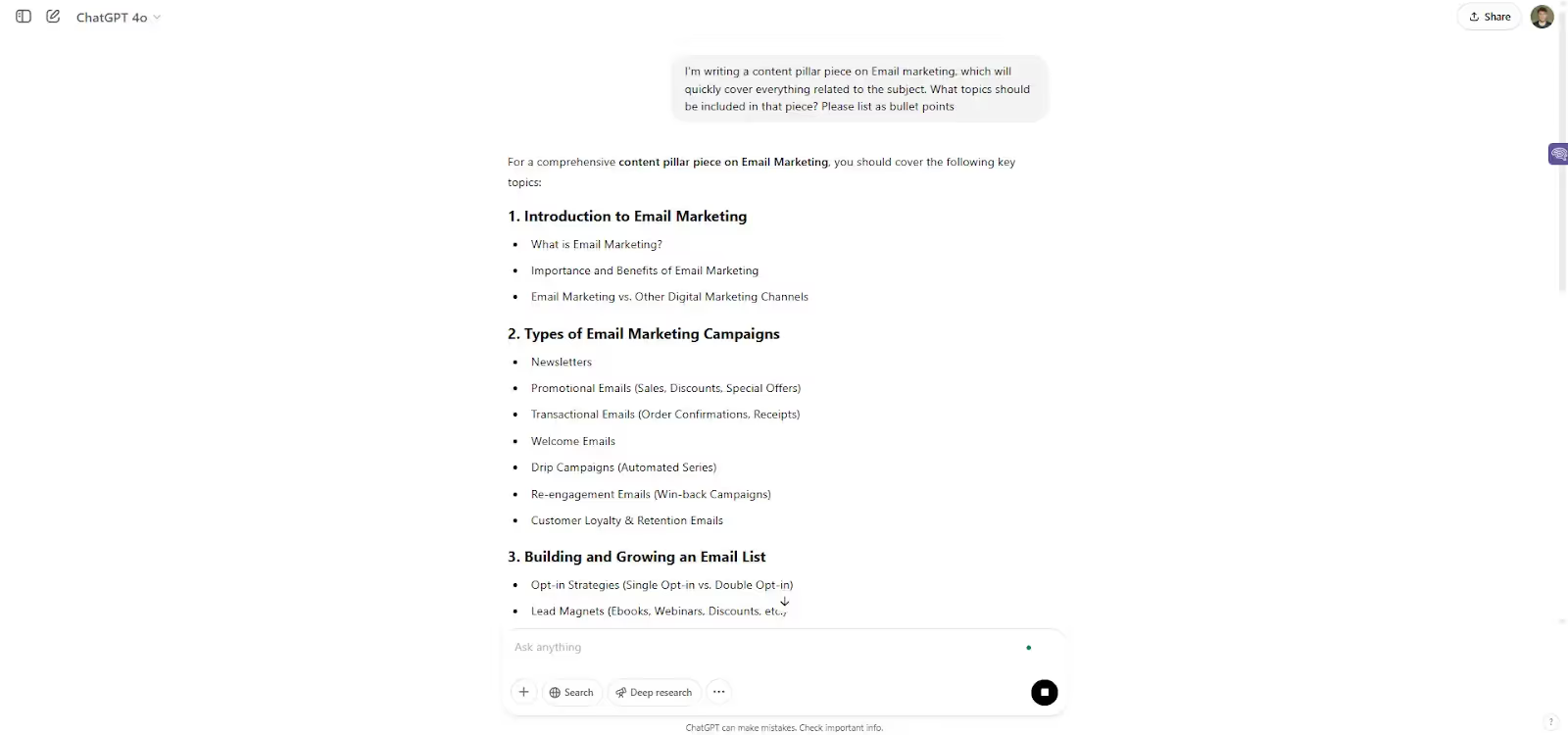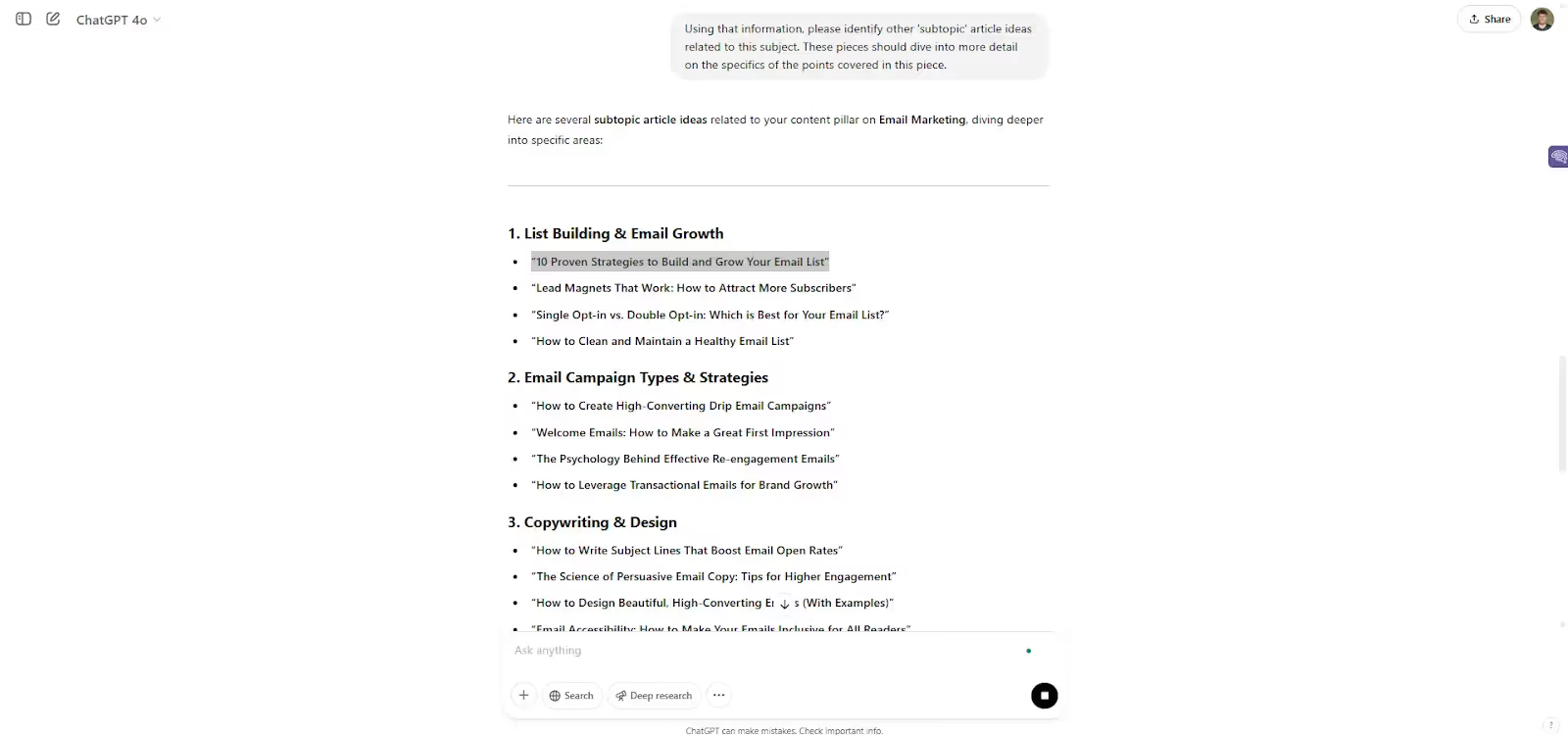Pillar content is absolutely crucial for any effective content marketing strategy.
You’ve probably heard marketing experts discuss the importance of pillar content, as well as its benefits.
But what is pillar content, and how can you identify topics you should be covering as part of your pillar content efforts?
Here, we will talk about pillar content in more detail and how you can use it to improve your WordPress site.
Get a best-in-class suite of tools to complement your marketing strategy with the Originality.ai WordPress Plugin, Content Optimizer, AI Checker, Plagiarism Checker, and Grammar Checker.
First off, what is a pillar page? Pillar pages, often also referred to as pillar content, are detail-focused, high-quality articles that cover every significant aspect of a specific topic.
They act as an overarching piece of content that should then be supported by lots of smaller posts that dive deeper into the subtopics.
Example: You could write an article on the concept of email marketing, briefly touching on subjects like trigger emails, open rates, and conversions. Then, you could create a series of additional articles that cover those topics specifically in more detail.
Think of a pillar piece as a topline overview that offers users just enough detail to get a basic understanding and then links out to more detailed posts and subtopics.
The primary aim of pillar content is to act as a content organizer, segmenting your other pieces into specific areas, allowing readers and search engines to easily access, segment, and digest your content.
In total, there are three main types of pillar content:
Now you have a better understanding of what pillar content is and its different forms, let’s take a look at another important question: why should you produce pillar content?
After all, you are likely already extremely busy producing other forms of content for your WordPress site, so it’s important to understand some of the benefits that high-quality pillar content can provide.
The biggest selling point for producing pillar content is improving topical authority, which can lead to more sales of your product or service.
Briefly put yourself in your target audience’s shoes.
Pillar content can help them see that you fully understand the topic that you’re covering. This, in turn, builds confidence in what you will deliver, as you’ll have clearly shown that you are an expert in the industry.
However, pillar content doesn’t just help improve your topical authority with your customers. It also helps improve your authority in the eyes of search engines.
This type of content shows Google and other search engines that you know the subject and can be treated as a reputable source of knowledge.
As a result, you’re more likely to get favorable rankings.
Better rankings equal more organic traffic, bringing more of your target audience to your website and growing brand awareness as a result.
Then, the cycle above repeats: more leads convert into customers, Google sees more people trusting your content and ranks your pages higher, which drives more organic traffic, and so on!
While those benefits are significant, they are only possible if you are undertaking effective pillar content production. That means ensuring you find the right content pillars to cover and ensuring the content is of the highest quality.
With that in mind, here’s a quick guide so that you can publish the highest-quality content on your WordPress site.
For more in-depth information, check out our step-by-step guide on how to create pillar content pages.
First, you need to identify what keyword topics you need to cover as part of your content pillar project.
The best way to do this is to review the services that you provide and go from there.
Example: If you’re running a marketing agency, and the services you provide include PPC, email marketing, and SEO, then these three segments are crucial content pillars your website should cover.
After all, if you don’t have a comprehensive article covering everything to do with PPC, how can you expect new customers to feel confident that you are an expert on the subject? They need to see that you understand the topic in-depth, and a content pillar piece will help you achieve just that.
Next, it’s important to consider other articles that you’ll need to cover as part of your content cluster.
If you want your pillar piece to rank well on Google, then you’ll also need to come up with an array of additional article ideas on the subject, building out your sitemap and showing off your expertise.
One easy way to do this is via AI tools like ChatGPT.
Here’s an example prompt for mapping out an email marketing content cluster: ‘I'm writing a content pillar piece on Email marketing, which will quickly cover everything related to the subject. What topics should be included in that piece? Please list as bullet points’

Now you have everything you need for your pillar piece, a quick follow-up prompt can then identify your subtopics: Using that information, please identify other 'subtopic' article ideas related to this subject. These pieces should dive into more detail on the specifics of the points covered in this piece.

Now, we have 30+ article ideas to improve our example content cluster for our WordPress blog or website.
Keep in mind that writing 30+ articles is no easy feat and requires a lot of time and resources! Not to mention the fact you’ll likely need to do this for multiple pillars.
That’s where understanding user intent is crucial to ensure you prioritize the right content first. Tools like Ahrefs are great for this, allowing you to review average monthly search traffic and how difficult it is to rank for that subject.
This can give you an idea if people are actively searching for the topic before you start writing.
Example: Using our list above, the term ‘Lead Magnet’ has a good volume of search. Then, Ahrefs notes that it is ‘Hard’ to rank for, which means that although there will be high competition for the keyword in the search results, users are searching for information on the topic.


Once you’ve conducted your keyword research, expanded on potential ideas with ChatGPT, and reviewed search intent, volume, and keyword difficulty, then it’s time to create the pillar content piece itself.
Considering that Google recently released updated Search Quality Rater Guidelines, which indicate that if most or all of the main content of a page is auto- or AI-generated, then raters should apply the ‘lowest’ rating — maintaining transparency is more important than ever.
The Originality.ai WordPress Plugin makes AI detection in WordPress a breeze, enabling you to scan for AI content directly within the WordPress CMS.
That way, you can identify potential instances of AI that need further amends and update your copy with people-first content that Google appreciates.
In summary, undertaking a content pillar project for your WordPress website is a long-term project for your brand, but the results can be significant, with improved conversions and more organic traffic.
To ensure you aren’t overly reliant on generative AI tools, be sure to check out the Originality.ai WordPress Plugin, so you can publish your pillar content on WordPress with confidence.
Then, learn more content marketing best practices:
